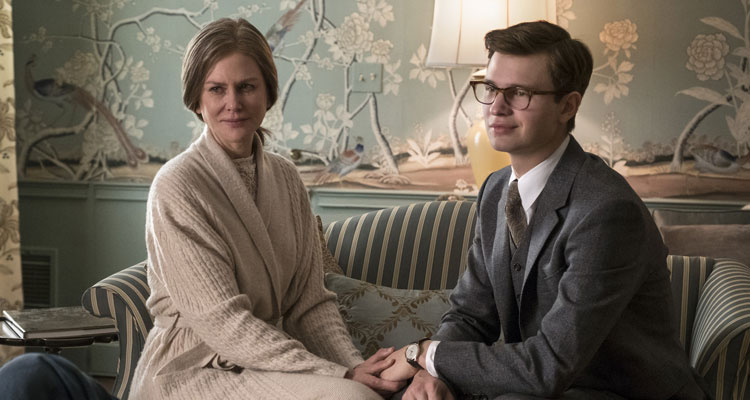The Goldfinch (USA / 16 / 149 mins)
In short: Good comes from bad
Directed by John Crowley. Starring Ansel Elgort, Oakes Fegley, Nicole Kidman, Jeffrey Wright, Luke Wilson, Sarah Paulson, Finn Wolfhard, Aneurin Barnard.
The Plot: Theo (Oakes Fegley) is something of a lost soul. His wayward father Larry (Luke Wilson) left him and his mother. Now he’s lost her in a terrorist bombing at the Metropolitan Museum Of Art in Manhattan. Amidst the chaos and carnage, he came to connect with two other survivors and retrieves a valuable painting from the rubble. He comes to live with the refined Mrs. Barbour (Nicole Kidman) and her family, who treat him as their son. Life has other plans for Theo though. Years later, the now-adult Theo (Ansel Elgort) works in an antique store. He’s still coming to terms with his guilt over the death of his mother and begins to question whether his life is really fulfilled. It’s all got to do with that 1654 painting of a shackled goldfinch by Carel Fabritius…
The Verdict: As the autumn leaves fall and the nights get darker and colder, out come the first inklings of Awards Season. Somewhere over the rainbow, Judy will be upon us. Before that is a prestige picture adaptation of The Goldfinch, Donna Tartt’s 2014 Pulitzer Prize winning book. Expectations are undoubtedly high for this one, but does it succeed in translating the scope of the book into a condensed 2.5 hour cinematic take on it? Yes and no. Cinema is a different medium and doesn’t have the luxury of the leisurely pacing of a book. There’s enough content in Peter Straughan’s literate screenplay to suggest a TV mini-series, but that might blunt the cinematic impact of the time-spanning story. Frequent Coen Brothers collaborator Roger Deakins cinematography is Oscar worthy alone.
As a standalone film, it’s a decent enough stab at wrestling and moulding the 880-page book into a workable format. Told out of sequence, the story spans two timeframes: the young, optimistic and wise-beyond-his-years Theo, feeling very much at home with his new family and wanting to escape from his actual family; and the adult Theo, a young man whose life seems to be going in promising directions. Scratch beneath the surface though and the adult Theo is vulnerable, unable to bury the ghosts of his past. As he finds out, life has a way of throwing curveballs at him and people that mean something to him. Theo chooses not to handle them though, so they become detritus in his seemingly normal life. This is the meat of the film, but how it’s handled is a source of contention.
Undoubtedly, the best part of the film is the younger timeline, which features a terrific performance from Oakes Fegley and strong support from Nicole Kidman. She not only brings the film up a notch with her effortlessly poignant performance, but represents a force for good when so little of it is present in Theo’s life. The scenes with Finn Wolfhard’s best buddy Boris also strike welcome notes of humour and childhood friendship. The later timeline is more of a serviceable one, designed to provide a resolution to the storyline. Irish director John Crowley of Brooklyn fame tries his best to connect the dots, but they don’t all add up.
There appears to be a disconnect between Theo’s transformation from a troubled but hopeful teenager into a sullen, unfilled young man. There’s a distinct lack of passion and purpose in the adult Theo. Straughan’s screenplay lacks the narrative depth to join the two Theos into one, even as the story heads towards a meaningful conclusion. The story itself works in a satisfying manner, it’s just the way Theo is handled in the film that doesn’t. That isn’t enough to disrupt the film’s hopeful message about redemption and the dangers of guilt-tripping. While having an ineffectual adult lead character might hobble other films, the good work done elsewhere (fine supporting actors, lush cinematography, soulful music) save it from being a dud adaptation. As Boris says at one point, sometimes good can come from bad.
Rating: 3 / 5
Review by Gareth O’Connor


